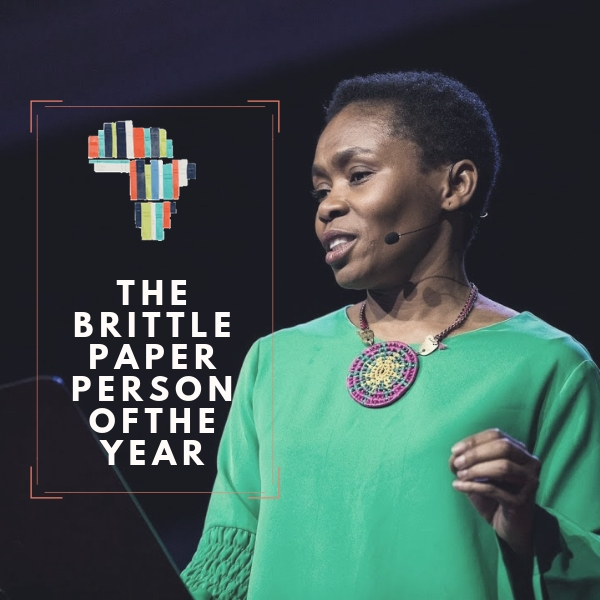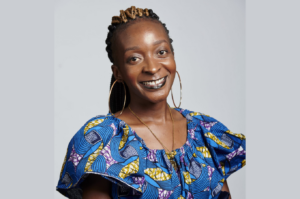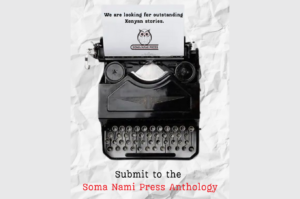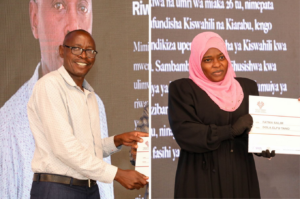
The Brittle Paper African Literary Person of the Year recognizes individuals who work behind the scenes to hold up the African literary establishment in the given year. Our 2018 honour goes to Dr. Bibi Bakare-Yusuf for her long service and leadership in publishing.
As Publishing Director of one of Africa’s most beloved indie presses, Cassava Republic, Bakare-Yusuf is a life-line. How Bakare came into publishing is a well-known story in the literary community. In 2003, she went on a research trip to Nigeria. During her visit, she made a disheartening observation. “I was puzzled,” she says in a TED Talk, “by the book shelves I saw. Sadly, many of them were empty.” For someone like her who believes that nations and civilizations are built on the cultivation of the character and creativity that come with reading, the empty book shelves were heartbreaking. But she didn’t just sit there and complain. She didn’t wait till she had funding from some foundation. She didn’t wait till she had an MBA. She began to lay plans to establish a publishing start-up at great financial sacrifice to herself.
In 2006 when Bakare-Yusuf co-founded Cassava Republic, African literature was beginning to gain momentum in the global literary scene—a long-awaited development from the drought of the ’90s—but was still nowhere near where it is today. While the rest of the world was still waiting to be convinced that African literature was cool and sexy and profitable, she took the plunge.
Bakare-Yusuf’s work with Cassava Republic was disruptive. It changed the way publishing was believed to work or not work in Africa. She broke a lot of rules and has never stopped finding ways to rethink and unthink established conventions. For example, in addition to traditional bookstores, she partnered with supermarkets, cafes and hair salons to sell books. She was one of the first African publishers to embrace the amazing work being done by Okada Books in digital publishing. In 2016, she struck a one-of-a-kind deal with Nigeria’s university entrance examination body Joint Admissions and Matriculation Board (JAMB), in which Sarah Ladipo Manyika’s 2008 novel In Dependence was sold along with JAMB’s materials, out-smarting book pirates. The deal led to the book selling three million copies. Where others see debilitating challenges, Bakare-Yusuf sees opportunities to make a difference.
“Bibi understood the power of form and substance long before it was cool to do so,” Sisonke Msimang, author of Always Another Country and The Resurrection of Winnie Mandela, tells us in an email. “She’s a forerunner—both ahead of the pack and totally committed to enlarging the pack. She literally doesn’t care about expectations. Cassava Republic is a testament to the power of our African imaginations, it’s an antidote to pessimism, an insistent reminder that we have always created alternate realities for ourselves and indeed the world.”
Cassava Republic has also published groundbreaking nonfiction books: Yemisi Aribisala’s memoir Longthroat Memoirs: Soups, Sex And Nigerian Taste Buds (2016), which became the first African book to win the John Avery Award for food writing; and the Ellah Wakatama Allfrey-edited Safe House: Explorations in Creative Nonfiction (2016), a reference point for creative nonfiction on the continent. Among their fiction books are such acclaimed titles as Doreen Baingana’s Commonwealth Prize-winning story collection Tropical Fish: Tales from Entebbe (2008), Teju Cole’s novella Every Day Is for the Thief (2007), Helon Habila’s novel Measuring Time (2007), Manyika’s Goldsmiths Prize-shortlisted second novel Like a Mule Bringing Ice Cream to the Sun (2016), Sade Adeniran’s Commonwealth Prize-winning Imagine This (2011), Lola Shoneyin’s Orange Prize-longlisted The Secret Lives of Baba Segi’s Wives (2010), Nnedi Okorafor’s novella What Sunny Saw in the Flames (2013), Elnathan John’s NLNG Prize-shortlisted novel Born on a Tuesday (2015), Petina Gappah’s Baileys Prize-longlisted The Book of Memory (2015), Leye Adenle’s crime novel Easy Motion Tourist (2016), and Olumide Popoola’s novel When We Speak of Nothing. Thirty-three authors and fifty-two titles later, we can safely say that part of our African literary renaissance would not have taken place or would have been postponed without Bakare-Yusuf’s timely intervention 12 years ago.
“What I admire the most about Bibi is her ambition. Her vision is for Cassava Republic as a global business, a global brand,” says Emma Shercliff, Cassava Republic’s Sales & Rights Director. “The JAMB deal is a brilliant example of this ingenuity. Bibi constantly challenges the status quo and accepted wisdoms. This makes her a demanding colleague and she is equally exacting as an editor, and makes no bones about the demands she will place on authors. But it is this drive which explains why Cassava Republic has established a reputation for publishing such high-quality titles. Her publishing speaks for itself—her stated mission of curating an archive for the future means that every book she publishes, be it fiction or non-fiction, is innovative, thought-provoking and changes the conversation in some way. Bibi is also extremely collaborative, searching for opportunities to support other publishers, and to work together to promote African writers globally.”
Cassava Republic’s intervention has not gone unnoticed in global publishing. In April of this year, at the London Book Fair’s International Excellence Awards, Cassava Republic was recognized with the Inclusivity in Publishing Award. It set the tone for what was to continue. Later that month, the company published She Called Me Woman: Nigeria’s Queer Women Speak, co-edited by Azeenarh Mohammed, Chitra Nagarajan, and Rafeeat Aliyu. In May, it published Ayesha Haruna Attah’s slave trade era novel The Hundred Wells of Salaga. In September, it published Adenle’s follow-up thriller When Trouble Sleeps and secured the NLNG Prize-winning novelist Abubakar Adam Ibrahim’s book publication rights. In October, it published Emmanuel Iduma’s A Stranger’s Pose, a mix of memoir, travelogue, and photography that reinveints African travel writing. And in December, at the third Abantu Book Festival, Bakare-Yusuf delivered the Keynote Address. Cassava Republic has now opened up shop in the UK and in the US, becoming the first African-run publishing house to do so in the former. By doing this, Bakare-Yusuf is reversing the flow of cultural knowledge. Africa is exporting its creative resources on its own terms, expanding its cultural influence, as opposed to passively waiting to be influenced by the West.
Bakare-Yusuf has a PhD in Gender Studies from the University of Warwick. She started out as an academic and, even in her entrepreneurial work, she has retained that academic passion for knowledge and teaching. Perhaps that is why she is not your run-of-the-mill business owner. She runs her business with heart and tons of love but also with a clear ideological objective. Every book she publishes, every writer she mentors, every reader she inspires, every critic she engages with contributes towards what she calls “an African archive of the future.” She is investing in a structure that will serve generations to come. Naturally, she does not hesitate to protest any erosion of the important work being done. In June, in a piece on its site, Cassava Republic warned against “the deletion of local publishing houses.”
She has been the “hustler extraordinaire of Cassava republic,” says Sylvia Ofili, author of Cassava Republic novel German Calendar No December. “For some reason, of all the conversations, mails and texts I have exchanged with Bibi over the years, this is the one that I have never forgotten: ‘Break the rules, Sylvia.’ She is an incorrigible rule breaker. Cassava republic and Bibi have been a study in patience, tenacity and perseverance.”
It is a marvelous thing to have a hand in another person’s success. Today, Bakare-Yusuf fosters a space where the dreams of writers come true and the needs of readers are met. She and her small team perform magic every year. With their rich catalogue and limited resources, they are out-performing peer American- and British-run publishing houses. Their books are in stores across continents and on university syllabi and high school curricula.
It is rare to find someone who is powerful, good at what they do, and also genuinely kind. There aren’t a lot of publishers who appreciate what bloggers and critics do for the literary industry the way Bakare-Yusuf does. She has said, time and again in interviews, that it takes a village to sustain a publishing industry, praising the work that sites like Africa Is a Country, Africa in Dialogue, Africa in Words, James Murua’s Literature Blog, The Johannesburg Review of Books, The Reading List, and the rest of us do.
We do not know how she does it, but we know that the African literary scene as we know it today would be very different without Bakare-Yusuf, if Bakare-Yusuf were not the brave entrepreneur who has continued to be a stalwart of our cultural life. Manyika, whose Like a Mule has now sold to publishers in six territories, perhaps sums it up best: “Bibi Bakare Yusuf is a visionary who, in the space of 12 years has brought the publishing house that she founded to international acclaim. She’s a pioneer and trend-setter with an impressive stable of authors, several of whom are prize winners and/or best sellers, including every single ‘Brittle Paper African Literary Person of the Year’ winner”—Nnedi Okorafor in 2015, Petina Gappah in 2016, and Lola Shoneyin in 2017. “Equally impressive,” Manyika continues, “is what Bibi does behind the scenes by way of encouragement, not only to her own authors but also to a wide circle of others as she seeks to transform and uplift the African publishing scene. Crucial to her success is the courage to champion issues that she knows to be important.”
In the name Cassava Republic, Bakare-Yusuf hoped to create a press that would make reading a cultural staple for the people, in much the same way that cassava is a food staple. But she ended up impacting the forces of global publishing by laying the foundation for Africa to lead the world in cultural and aesthetic innovation.
Congratulations:
Dr. Ainehi Edoro, Editor,
Otosirieze Obi-Young, Deputy Editor.









Bibi Bakare-Yusuf is the 2018 Brittle Paper African Literary Person of the Year - African Politics and Policy January 03, 2019 01:07
[…] The 2018 Brittle Paper African Literary Person of the Year Is Bibi Bakare-Yusuf […]